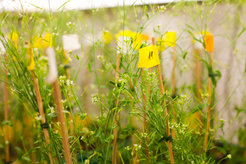Microbes & Immunity
While we understand in great detail the biochemical mechanisms of plant immunity, we still know very little about the interaction of plant populations with pathogens and other microbes in nature.

Most species on Earth are parasites, and organisms that parasitize plants are ubiquitous. What has been holding the field back is a lack of understanding which parasites drive immune system diversity in natural populations, and which host plants in turn drive diversity in the parasites. Beginning with samples from the wild collected on field trips, we apply both genome-sequencing and pathogen testing to determine the role of local adaptation in plant-pathogen interactions.
These efforts draw on an increasing number of complete genome assemblies of both plants, especially Arabidopsis thaliana, and pathogens, which are beginning to reveal a highly complex picture of variation at host immune receptors and matching pathogen effectors. In parallel, we are developing high-throughput methods with which we can directly determine which pathogen effector variants can be detected by which host receptor variants.
In an orthogonal approach, we are trying to understand the role that assemblages of pathogenic and non-pathogenic microbes have in plant colonization by microbial communities. This particular effort is supported by an ERC Synergy Grant, for which we have teamed up with the groups of Fabrice Roux in Toulouse and Joy Bergelson in New York.
- Co-evolution of Arabidopsis and its pathogens
- Microbiome analyses in natural plant populations
- Effect of microbiome composition on plant colonization by pathogens
Team
Show team members from our department
Collaboration Partners
- Joy Bergelson, NYU, USA
- Jane Parker, Max Planck Institute for Breeding Research, Cologne
- Fabrice Roux, CNRS, France
References
Karasov, T. L., Almario, J., Friedemann, C., Ding, W., Giolai, M., Heavens, D., Kersten, S., Lundberg, D. S., Neumann, M., Regalado, J., Neher, R. A., Kemen, E., and Weigel, D. (2018) Arabidopsis thaliana and Pseudomonas pathogens exhibit stable associations over evolutionary time scales. Cell Host Microbe 24, 168-179.
Li, L., Habring, A., Wang, K., and Weigel, D. (2020) Atypical resistance protein RPW8/HR triggers oligomerization of the NLR immune receptor RPP7 and autoimmunity. Cell Host Microbe 27, 405-417.
Lundberg, D. S., Na Ayutthaya, P. P., Strauß, A., Shirsekar, G., Lo, W.-S., Lahaye, T., and Weigel, D. (2021) Host-associated microbe PCR (hamPCR) enables convenient measurement of both microbial load and community composition. eLife 10, e66186.
Shalev, O., Karasov, T., Lundberg, D. S., Ashkenazy, H., Na Ayutthaya, P. P., and Weigel, D. (2022) Protective host-dependent antagonism among Pseudomonas in the Arabidopsis phyllosphere. Nat. Ecol. Evol. 6, 383-396
